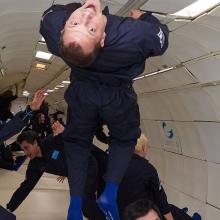The Zero Gravity Corporation, or Zero G, offers adventure tourists and air and space enthusiasts the experience of weightlessness. Founded in 2004, Zero G has made a business of taking participants into the atmosphere aboard the nearly empty fuselage of a modified 727 jet and plunging them over several aerobatic parabolas so that they experience the effects of free-fall. Since NASA canceled its own microgravity program in 2014, Zero G is the only U.S. company that offers paying private customers the chance to play astronaut. Zero G also now contracts with researchers (including NASA) to provide a weightless lab space for experiments, and partners with museums and schools to offer weightless classrooms.
Zero G plays up its educational aspects, dressing participants in space-station-style outfits, and peppering its website with famous thinker-clients like Stephen Hawking, a valence toward education in marketing that may cover for an anti-theatrical anxiety haunting Zero G’s main purpose as purveyor of entertainment. After all, the company’s regular business to offer high-end thrill rides to adventure tourists, but Zero G and reduced gravity companies abroad also rent out flights to the entertainment industry for feature films (like The Mummy) and music videos (OK Go’s “Upside Down Inside Out”), to swimsuit model shoots (like Kate Upton for Sports Illustrated), and fragrance commercials (Justin Bieber’s “Someday”).
My own role as educator, researcher, and participant-observer is to try to cut through the educational spin Zero G puts on its programming to recover its performance practices as part of the emerging industry of space tourism. Which is some of what I hope to do today. But what I will also suggest in this paper is that reduced gravity flight not only pushes the envelope (that’s a phrase from early attempts at space flight) pushes the envelope of human performance by inviting participants to simulate astronauts without the usual constraints of gravity seemingly plaguing our mortal coils on earth, it also, probably unintentionally, points to the very ways by which our ideas of performance on stage and in the practice of everyday life are fundamentally shaped by gravity and the desire to defy it. And so after briefly going over the history and goals of reduced gravity flights, I’ll talk about my own experience playing astronaut a few weeks ago (thanks to a generous research fellowship from the American Society for Theatre Research), and how it allowed me to find new spins on the age old topic of performance.

